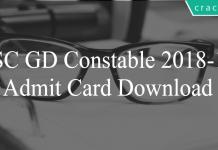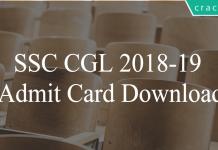Linear Equation Questions For SSC Stenographer PDF
SSC Stenographer Constable Linear Equation Question and Answers download PDF based on previous year question paper of SSC Stenographer exam. 20 Very important Linear Equation questions for Stenographer Constable.
LINEAR EQUATION QUESTIONS FOR SSC STENOGRAPHER PDF
10 Stenographer Mock Tests – Just Rs. 117
Download All Important SSC Stenographer Questions PDF (Topic-Wise)
SSC Stenographer Free Mock Test (Latest Pattern)
SSC Stenographer Previous Papers
Question 1: Two linear equations 3x+5y=20, 24x+40y=K will have no solution for x and y when k = ?
a) 160
b) 8
c) 40
d) both b and c
Question 2: x+3y=12 and 5x+15y=3k are two linear equations then for what value of k will the equations have infinite solutions ?
a) 0
b) 4
c) 20
d) 12
Question 3: if (2, 0) is a solution of the linear equation 2x+3y=K, then the value of K is
a) 5
b) 2
c) 6
d) 4
Question 4: What is the x – intercept of the linear equation 18x + 25y – 900 = 0?
a) 18
b) 25
c) 50
d) 450
Question 5: How many solutions does a pair of linear equations will have, if the equations are
7x+4y-16=0 and 14x+6y-32=0?
a) 0
b) 1
c) 2
d) Infinite
Download SSC Stenographer Syllabus PDF
Question 6: What is the y – intercept of the linear equation 59x + 14y – 112 = 0?
a) 8
b) 14
c) 28
d) 59
Question 7: If $x^{3} – y^{3} = 112$ and $x – y = 4$, then what is the value of $x^{2} + y^{2}$?
a) 16
b) 20
c) 24
d) 28
FREE SSC MATERIAL – 18000 FREE QUESTIONS
Question 8: If $(1/x) + (1/y) + (1/z) = 0$ and $x + y + z = 11$, then what is the value of $x^{3}+y^{3}+z^{3}-3xyz$ ?
a) 1331
b) 2662
c) 3993
d) 14641
Question 9: If P = (√7 – √6)/(√7 + √6), then what is the value of P + (1/P)?
a) 12
b) 13
c) 24
d) 26
Question 10: If$\frac{1}{x+2}=\frac{3}{y+3}=\frac{1331}{z+1331}=\frac{1}{3}$, then what is the value of $\frac{x}{x+1}+\frac{4}{y+2}+\frac{z}{z+2662}?$
a) 0
b) 1
c) 3/2
d) 3
Question 11: If x=a(b-c), y=b(c-a), z=c(a-b), then the value of $(\frac{x}{a})^3\ +\ (\frac{y}{b})^3\ +\ (\frac{z}{c})^3\ $is:
a) $\frac{xyz}{abc}$
b) 0
c) $\frac{3xyz}{abc}$
d) $\frac{2xyz}{abc}$
Question 12: In an exam the sum of the scores of A and B is 120, that of B and C is 130 and that of C and A is 140. Then the score of C is
a) 65
b) 60
c) 70
d) 75
Question 13: If x (x+y+z) = 20, y (x+y+z) = 30, & z(x+y+z)=50, then the value of 2(x+y+z) is:
a) -10
b) 15
c) 18
d) 20
Question 14: If $Cos\ \theta + Sin\ \theta$ = m and $Sec\ \theta + Cosec\ \theta$= n then the value of n($m^{2}-1$) is equal to:
a) 2n
b) 4mn
c) mn
d) 2m
Question 15: If $x=a(sin\ \theta + cos\ \theta)$ and $y=(sin\ \theta – cos\ \theta)$, then the value of $\frac{x^{2}}{a^{2}}+\frac{v^{2}}{b^{2}}$ is:
a) 3
b) 4
c) 2
d) 1
SSC STENOGRAPHER PREVIOUS PAPERS
Question 16: A man walks a certain distance in certain time, if he had gone 3 km an hour faster, he would have taken 1 hour less than the schedule time. If he had gone 2 km an hour slower, he would have been one hour longer on the road. The distance (in km) is
a) 45
b) 65
c) 80
d) 60
Question 17: If $xy=\frac{a+2}{3}$ and $\frac{x}{y}=\frac{1}{3}$, then find the value of $\frac{x^{2}+y^{2}}{x^{2-}y^{2}}$
a) 1
b) 4
c) 3
d) None of these
Question 18: What is the value of equation $a^3 + b^3 + c^3 – 3abc$ if $a^2 + b^2 + c^2 = ab + bc + ca + 4$ and $a + b + c = 4$
a) 0
b) 1
c) 16
d) 256
Question 19: What is the value of $x^4 + y^4$ when the value of $x^3+y^3 = 8$ and $x + y = 2$?
a) 2
b) 8
c) 16
d) 32
Question 20: The pair of equations are 7x+8ky-16=0 and 14x+112y-21=0. Find the value of ‘k’ for which the system is inconsistent.
a) 2
b) 3
c) 5
d) 7
Stenographer Expected Cut off 2018-19
SSC Stenographer Salary after 7th Pay Commission
Answers & Solutions:
1) Answer (D)
For the given two equations 3x+5y=20 and 24x+40y=k
8(3x+5y)=k
3x+5y=($\frac{k}{8}$)
They have infinite solutions if k=160 and for all other values of k it will have no solution.
2) Answer (C)
x+3y=12$\rightarrow$ 1
5(x+3y)=3k
x+3y=$\frac{3k}{5}\rightarrow$ 2
These both equations represent a single equation and have infinite solutions when $\frac{3k}{5}$=12.
$\therefore$ k=20.
3) Answer (D)
Given (2,0) is a solution of the equation 2x + 3y = k.
Substitute x = 2 and y = 0
k = 2(2) + 3(0) = 4
Hence, option D is the correct answer.
4) Answer (C)
Equation of line : $18x+25y-900=0$
To find x-intercept, we need to put $y=0$ (and vice-versa)
=> $18x+25(0)=900$
=> $x=\frac{900}{18}=50$
=> Ans – (C)
5) Answer (B)
Equations : 7x+4y-16=0 and 14x+6y-32=0
Comparing the ratio of coefficients of both equations,
=> $\frac{7}{14}\neq\frac{4}{6}$
Thus, there is only 1 solution.
=> Ans – (B)
6) Answer (A)
Equation = $59x+14y-112=0$
=> $14y=-59x+112$
=> $y=\frac{-59x+112}{14}$
=> $y=\frac{-59}{14}x+8$
Comparing above equation with $y=mx+c$, where $c$ is the y-intercept.
=> y-intercept = 8
=> Ans – (A)
7) Answer (C)
Given : $x^3-y^3=112$ ————–(i)
Also, $x-y=4$ ————-(ii)
Cubing both sides, we get :
=> $(x-y)3=(4)^3$
=> $(x^3-y^3)-3(x)(y)(x-y)=64$
Substituting values from equations (i) and (ii),
=> $112-3xy(4)=64$
=> $12xy=112-64=48$
=> $xy=\frac{48}{12}=4$ ———–(iii)
Now, squaring equation (ii), we get :
=> $x^2+y^2-2xy=16$
=> $x^2+y^2=16+8=24$
=> Ans – (C)
8) Answer (A)
Given : $\frac{1}{x}+\frac{1}{y}+\frac{1}{z}=0$
=> $\frac{yz+zx+xy}{xyz}=0$
=> $xy+yz+zx=0$ ————-(i)
Also, $x+y+z=11$ ————(ii)
Squaring both sides, we get :
=> $(x+y+z)^2=(11)^2$
=> $(x^2+y^2+z^2)+2(xy+yz+zx)=121$
Substituting value from equation (i),
=> $x^2+y^2+z^2=121$ ————(iii)
To find : $x^{3}+y^{3}+z^{3}-3xyz$
= $(x+y+z)[(x^2+y^2+z^2)-(xy+yz+zx)]$
Substituting values from equations (i), (ii) and (iii),
= $(11)(121-0)$
= $11\times121=1331$
=> Ans – (A)
9) Answer (D)
Given : $P=\frac{\sqrt7-\sqrt6}{\sqrt7+\sqrt6}$ —————(i)
=> $\frac{1}{P}=\frac{\sqrt7+\sqrt6}{\sqrt7-\sqrt6}$ ———-(ii)
Adding equations (i) and (ii),
=> $P+\frac{1}{P}=(\frac{\sqrt7-\sqrt6}{\sqrt7+\sqrt6})+(\frac{\sqrt7+\sqrt6}{\sqrt7-\sqrt6})$
= $\frac{(\sqrt7-\sqrt6)^2+(\sqrt7+\sqrt6)^2}{(\sqrt7+\sqrt6)(\sqrt7-\sqrt6)}$
= $\frac{(13-2\sqrt{42})+(13+2\sqrt{42})}{7-6}$
= $13+13=26$
=> Ans – (D)
10) Answer (C)
Given $\frac{1}{x+2}=\frac{1}{3}$
We get x = 1 …..(1)
$\frac{3}{y+3}=\frac{1}{3}$
we get y = 6 …..(2)
$\frac{1331}{z+1331}=\frac{1}{3}$
we get z = 2662 ….(3)
We need to find $\frac{x}{x+1}+\frac{3}{y+3}+\frac{z}{z+2662}$
Substitute equations (1), (2) and (3) in the above equation
= $\frac{1}{1+1}+\frac{3}{6+3}+\frac{2662}{2662+2662}$
= $\frac{1}{2}+\frac{3}{9}+\frac{1}{2}$
= $\frac{3}{2}$
Hence, option C is the correct answer.
FREE MOCK TEST FOR SSC STENOGRAPHER
11) Answer (C)
Given : $x=a(b-c)$ , $y=b(c-a)$ , $z=c(a-b)$
=> $\frac{x}{a}=(b-c)$ ————-(i)
and $\frac{y}{b}=(c-a)$ ————-(ii)
and $\frac{z}{c}=(a-b)$ ————-(iii)
Adding equations (i), (ii) and (iii), we get :
=> $\frac{x}{a}+\frac{y}{b}+\frac{z}{c}=(b-c)+(c-a)+(a-b)$
=> $\frac{x}{a}+\frac{y}{b}+\frac{z}{c}=0$
Now, we know that if $(p+q+r)=0$, then $p^3+q^3+r^3=3pqr$
$\therefore$ $(\frac{x}{a})^3\ +\ (\frac{y}{b})^3\ +\ (\frac{z}{c})^3\ $
= $3\times(\frac{x}{a})\times(\frac{y}{b})\times(\frac{z}{c})$
= $\frac{3xyz}{abc}$
=> Ans – (C)
12) Answer (D)
Let scores of A, B and C are $a,b$ and $c$ respectively.
According to ques, => $a+b=120$ ————–(i)
$b+c=130$ ————–(ii)
$c+a=140$ ————–(iii)
Adding above equations, we get : $2(a+b+c)=(120+130+140)$
=> $a+b+c=\frac{390}{2}=195$
Substituting value from equation (i) in above equation,
=> $120+c=195$
=> $c=195-120=75$
=> Ans – (D)
13) Answer (D)
Given : $x(x+y+z)=20$
=> $x^2+xy+xz=20$ —————–(i)
Similarly, => $y^2+xy+yz=30$ —————–(ii)
and $z^2+xz+yz=50$ —————–(iii)
Adding equations (i), (ii) and (iii), we get :
=> $(x^2+y^2+z^2)+2(xy+yz+xz)=20+30+50$
=> $(x+y+z)^2=100$
=> $(x+y+z)=\sqrt{100}=10$
$\therefore$ $2(x+y+z)=2\times10=20$
=> Ans – (D)
14) Answer (D)
Given : $cos\ \theta + sin\ \theta=m$ ————–(i)
Squaring both sides, we get :
=> $(cos\ \theta + sin\ \theta)^2=(m)^2$
=> $cos^2\ \theta+sin^2\ \theta+2sin\ \theta.cos\ \theta=m^2$
=> $1+2sin\ \theta.cos\ \theta=m^2$
=> $sin\ \theta.cos\ \theta=\frac{m^2-1}{2}$ ————-(ii)
Also, it is given that : $sec\ \theta + cosec\ \theta=n$
=> $\frac{1}{cos\ \theta}+\frac{1}{sin\ \theta}=n$
=> $\frac{sin\ \theta+cos\ \theta}{sin\ \theta.cos\ \theta}=n$
Using equations (i) and (ii), => $m=\frac{m^2-1}{2}\times n$
=> $n(m^2-1)=2m$
=> Ans – (D)
15) Answer (C)
Given : $x=a(sin\ \theta + cos\ \theta)$ and $y=(sin\ \theta – cos\ \theta)$
Squaring both sides, we get :
=> $x^2=a^2(sin\ \theta+cos\ \theta)^2$
=> $x^2=a^2(sin^2\ \theta+cos^2\ \theta+2sin\ \theta.cos\ \theta)$
=> $x^2=a^2(1+2sin\ \theta.cos\ \theta)$
=> $\frac{x^2}{a^2}=1+2sin\ \theta.cos\ \theta$ —————-(i)
Similarly, $\frac{y^2}{b^2}=1-2sin\ \theta.cos\ \theta$ —————-(i)
Adding both equations (i) and (ii),
=> $\frac{x^{2}}{a^{2}}+\frac{v^{2}}{b^{2}}$ $=(1+2sin\ \theta.cos\ \theta)+(1-2sin\ \theta.cos\ \theta)$
= $1+1=2$
=> Ans – (C)
16) Answer (D)
Let ideal speed of man = $s$ km/hr and ideal time = $t$ hours
=> Distance = $d=st$ ————(i)
According to ques, => $d=(s+3)(t-1)$
=> $d=st-s+3t-3$
Thus, using equation (i), => $3t-s=3$ ————(ii)
Also, $d=(s-2)(t+1)$
=> $d=st+s-2t-2$
=> $-2t+s=2$ ————(iii)
Adding equations (ii) and (iii), we get :
=> $3t-2t=3+2$
=> $t=5$
Substituting above value in equation (ii), => $s=3(5)-3=15-3=12$
$\therefore$ Distance = $12\times5=60$ km
=> Ans – (D)
17) Answer (D)
Given : $xy=\frac{a+2}{3}$ and $\frac{x}{y}=\frac{1}{3}$
Multiplying both equations, we get : $x^2=\frac{a+2}{9}$ ————-(i)
Dividing both equations, => $y^2=a+2$ ————-(ii)
Adding equations (i) and (ii),
=> $x^2+y^2=(\frac{a+2}{9})+(a+2)=\frac{9a+18+a+2}{9}$
=> $x^2+y^2=\frac{10a+20}{9}$ ———–(iii)
Similarly, subtracting equation (ii) from (i), => $x^2-y^2=\frac{-8a-16}{9}$ ————-(iv)
Dividing equation (iii) by (iv), we get :
=> $\frac{x^2+y^2}{x^2-y^2}=(\frac{10a+20}{9})\div(\frac{-8a-16}{9})$
= $\frac{10a+20}{-8a-16}=\frac{10(a+2)}{-8(a+2)}$
= $\frac{-5}{4}$
=> Ans – (D)
18) Answer (C)
Given : $a + b + c = 4$ ———–(i)
and $a^2 + b^2 + c^2 = ab + bc + ca + 4$
=> $a^2 + b^2 + c^2 – ab – bc – ca = 4$ ————(ii)
To find : $a^3 + b^3 + c^3 – 3abc$
= $(a+b+c)(a^2+b^2+c^2-ab-bc-ca)$
Substituting values from equations (i) and (ii), we get :
= $4\times4=16$
=> Ans – (C)
19) Answer (C)
Given : $x^3+y^3=8$ ———–(i)
and $x+y=2$ ————(ii)
Cubing both sides, we get :
=> $(x+y)^3=(2)^3$
=> $x^3+y^3+3xy(x+y)=8$
Substituting values from equations (i) and (ii),
=> $8+3xy(2)=8$
=> $6xy=8-8=0$
=> $xy=0$ ———–(iii)
Now, squaring equation (ii), => $(x+y)^2=(2)^2$
=> $x^2+y^2+2xy=4$
=> $x^2+y^2=4$ $[\because xy=0]$
Similarly, again squaring both sides, we get :
=> $x^4+y^4+2x^2y^2=16$
=> $x^4+y^4+2(xy)^2=16$
=> $x^4+y^4=16$
=> Ans – (C)
20) Answer (D)
Equations : 7x+8ky-16=0 and 14x+112y-21=0
For two equations to be inconsistent (no solution), the ratio of coefficients of both equations must be of the form = $\frac{a_1}{b_1}=\frac{a_2}{b_2}\neq\frac{c1}{c_2}$
=> $\frac{7}{14}=\frac{8k}{112}\neq\frac{-16}{-21}$
=> $\frac{k}{14}=\frac{1}{2}$
=> $k=\frac{14}{2}=7$
=> Ans – (D)
SSC STENOGRAPHER STUDY MATERIAL TOPIC-WISE
We hope this Linear Equation questions for SSC Stenographer will be highly useful for your preparation.





